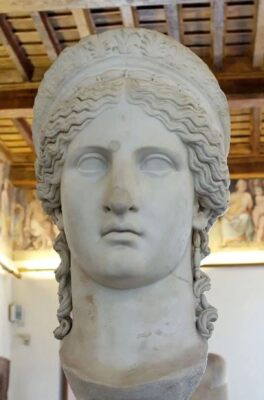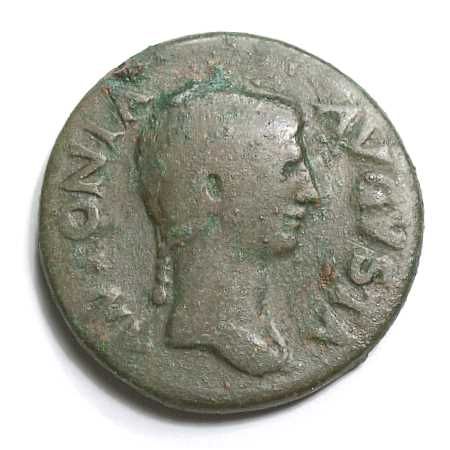Chapters
Antonia the Younger (JuliaAntonia Minor) was born on January 31, 36 BCE. in Athens. She was the second, next to Antonia the Elder, daughter of Mark Antony and Octavia the Younger. Wife of Drusus the Elder and mother of Germanicus and future Emperor Claudius.
Youth and origin
Shortly after birth, she returned with her mother and siblings from Athens (where Octavia and Antony raised Octavia’s children with Gaius Claudius Marcellus and Antony’s children from his earlier marriage, and her older sister, Antony the Elder), to Rome and practically did not know her own father, who in 32 BCE did not know her own father. he divorced Octavia, and in 30 BCE committed suicide.
Due to her origin, Antonia the Younger inherited large estates in Italy, Greece and Egypt. She was a rich and influential woman who accepted petitioners – they offered her services in return for their help. Antonia was the favourite niece of the first Roman emperor, Augustus, widely admired for her virtues and beauty. She had many friends, including: the wealthy Jew Alexander Alabarach or Lucius Vitellius – the future father of Emperor Vitellius.
Marriage to Druze I
In 16 BCE Antonia married the chief and consul Druzus I – son of Empress Livia, wife of Augustus from her first marriage, the younger brother of Emperor Tiberius. From their union, several children were born, but only three survived: Germanicus, Claudius and Livilla. Being the mother of Germanicus and Claudius, the grandmother of Caligula and the great-grandmother of Nero, she is an example of a woman who during the principate held as prominent and influential a position as men. Her husband died on June 9 BCE. as a result of complications after a fall from a horse.
An influential woman
Antonia did not remarry, despite pressure from Augustus. In Rome, she raised her children first, and then her grandchildren. In 29 CE, when Livia died, Antonia took care of Caligula, Agrippina the Younger, Julia Drusilla and Livilla, and Claudia Antonia. By the fact that in the years 29 to 32 CE the future Emperor Caligula grew up in her house, thanks to which he avoided the extermination that befell his family at the hands of Tiberius and Sejanus. Antonia, too, managed to convince Tiberius that Sejanus was seeking power and had ruined the hated commander of the Praetorian Guard.
His lover, and her own daughter Julia Liwilla, according to Cassius’ message, locked Dion in a room and starved to death. She treated her son, the future emperor Claudius, very badly because of his many diseases and physical disabilities. She publicly called him a monster and a fool. She inherited from her father, Marcus Antony, attachment to Egypt and introduced the Hellenistic royal style to Rome.
When in March 37 CE Tiberius died, and Caligula took his place, the new ruler made the senate grant her the same honours and the title of Augusta as that of Augustus’ wife Livia. In the end, however, she herself rejected this offer.
Soon Caligula was irritated by Antonia’s attempts to give him advice. According to Suetonius, he was supposed to say to her: “Remember that everything is allowed for me and for everyone.” Antonia strongly criticized Caligula for giving the order to kill her cousin Gemellus for allegedly plotting – Gemellus was also Antoni’s grandson. Being fed up with Caligula and his behaviour (she was probably also forced), she decided to commit suicide. This is how Suetonius describes it
When his grandmother Antonia asked for a private interview, he refused it except in the presence of the praefect Macro, and by such indignities and annoyances he caused her death; although some think that he also gave her poison. After she was dead, he paid her no honour, but viewed her burning pyre from his dining-room.
– Suetonius, Caligula, 23
Death
She died on May 1, 37 CE. Antonia the Younger was an extremely influential Roman woman and proved that a woman in Rome could play an important role in the socio-political life of the state. Antonia was also long-lived – she outlived her husband, eldest son and several of her grandsons.
Claudius after ascending the throne in 41 CE he gave the title of Augusta to his mother posthumously. Her birthday became a public holiday with sacrifices made and the games held.


